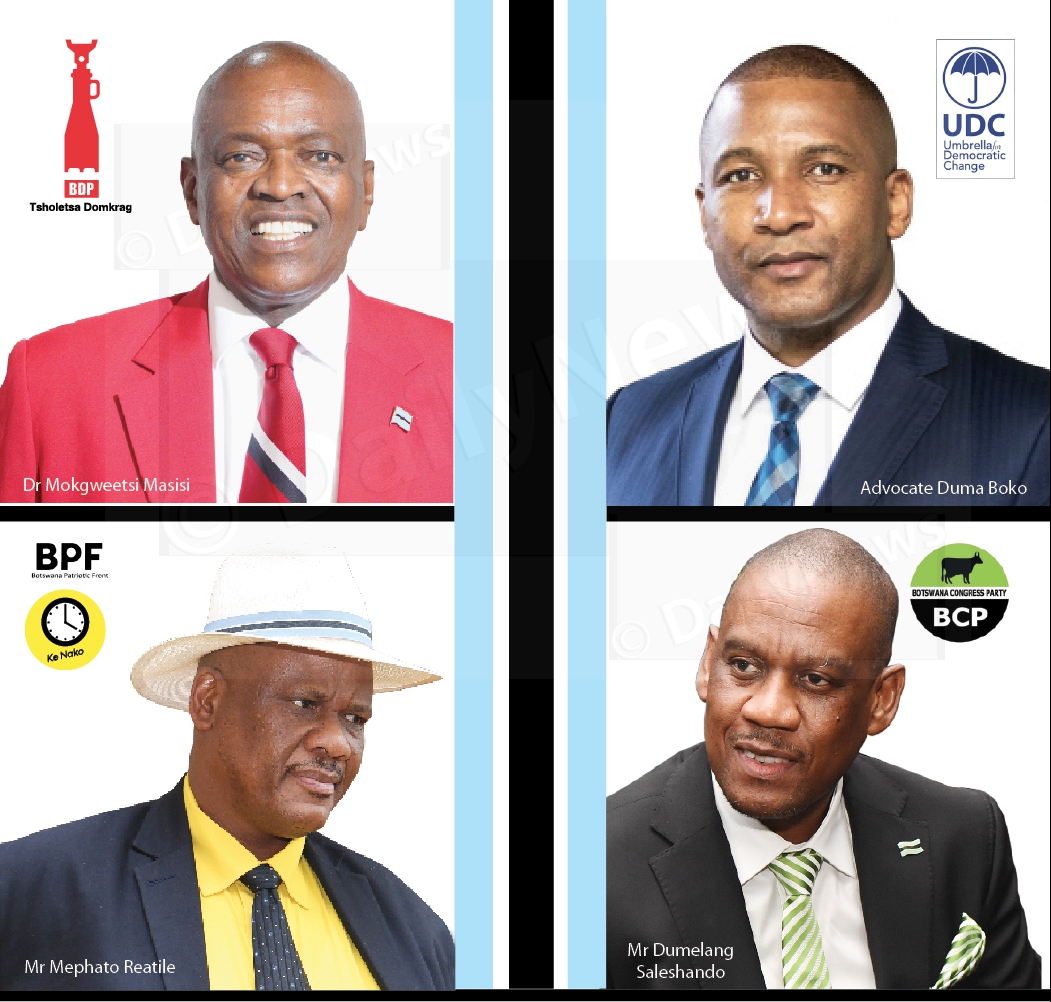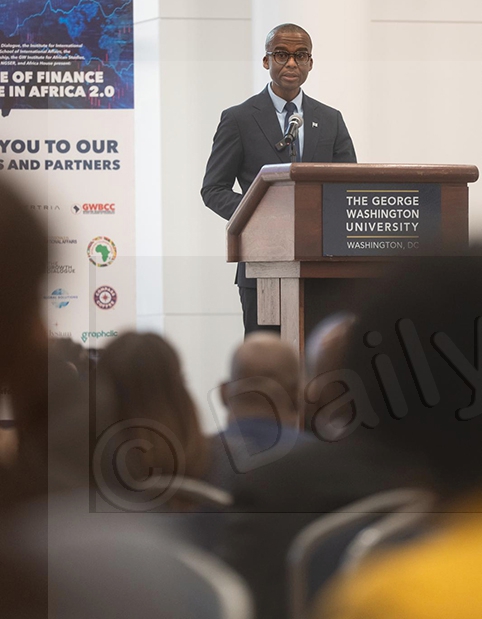22 Oct 2024
The journey of a thousand miles, as the old Chinese adage goes, begins with a single step.
As Botswana takes a journey towards United Nations Sustainable Development Goals (SDGs) Agenda 2030, and the attainment of the National Vision 2036, the direction of the steps taken towards such developmental milestones is due to be determined by who the nation chooses as its leader.
On Wednesday, October 30, four candidates will vie for the national presidency in the country’s 13th general elections, each with a manifesto of pledges to take the country forward.
The incumbent, President Dr Mokgweetsi Masisi of the ruling Botswana Democratic Party (BDP), Advocate Duma Boko of the Umbrella for Democratic Change (UDC), Mr Dumelang Saleshando of the Botswana Congress Party (BCP) and the Botswana Patriotic Front’s (BPF) Mr Mephato Reatile have satisfied the official process of presidential nominations at the High Court.
Each is vying to take the oath of office and steer the country as the President. DailyNews looks at the four presidential candidates, and what their political party manifestoes stand to offer the nation.
DR MOKGWEETSI MASISI
BOTSWANA DEMOCRATIC PARTY
The Botswana Democratic Party (BDP) has endorsed its leader, Dr Mokgweetsi Masisi as its presidential candidate. Born on July 21, 1963 in Moshupa and largely raised in Gaborone, Dr Masisi holds a degree from the University of Botswana and a Master’s in Social Sciences Education from Florida State University in the United States of America (USA).
A former teacher and an employee of the United Nations Children’s Education Fund (UNICEF), Dr Masisi joined active politics in 2004 and became a cabinet minister in 2009.
Having assumed office as the eighth Vice President (VP) of the Republic in 2014, Dr Masisi took oath of office as Botswana’s fifth President on April 1, 2018 at the end of the 10-year tenure of his predecessor, Lt. General Dr Seretse Khama Ian Khama. Dr Masisi then returned to office in the October 2019 polls, following his party’s victory.
In his introduction to the 2024 BDP Election Manifesto, Dr Masisi introduces the BDP, the governing party since independence, as a pragmatic political party whose wise stewardship of national resources has led to Botswana being a stable economy.
“Fellow citizens, on behalf of the BDP, and indeed on my own behalf as the party’s present leader, making extravagant and impossible promises is and has never been an option. Since our first manifesto in 1965 we have always taken our promises as a solemn covenant between us and Batswana,” Dr Masisi wrote.
He added, “Our sincerity in this regard is attested by our track record and the progress we have made since 1965, transforming a country ranked as one of the poorest in the world to one that has achieved a high middle-income status.
“We presided over the country’s resources guided by our enduring values of Democracy, Development, Self-reliance, Unity, and Botho. This is who we are, the BDP, a party that sincerely listens to and understands the aspirations of Batswana.”
He further noted that over the past five years, his government has managed to lead the country’s battle against the COVID-19 pandemic, saving lives, protecting businesses and livelihoods, and building a strong economic base for the post-COVID era.
Policy and legislation were enacted to ensure the fast tracking of land allocation, ensuring 100 000 plots were allocated over a two-year period nationally, the informal sector were supported with schemes such as Chema Chema, and an import restriction on selected produce stimulated the horticultural sector, Dr Masisi noted.
He further rallied the nation towards his mantra of Mindset Change; “a change that starts with the individual and permeating to all Batswana, a change of work ethic and improved productivity, a change to positive self-value and a herculean move towards self-reliance as a people and nation.”
Founded in 1962 by nationalists led by Seretse Khama, Ketumile Masire, Moutlakgola Nwako, Amos Dambe, Archeous Tsoebebe and Englishman Kgabo among others, the BDP presents itself as a party welded together by voluntarism and patriotism.
Leaning on the national principles of Democracy, Development, Self-reliance, Unity, and Botho and the consultative value of Therisanyo, which build Kagisanyo, national cohesion, the BDP has won the country’s previous 12 general elections, and produced the country’s five presidents thus far.
For the current electoral cycle, the BDP presents a manifesto titled, Changing Together; Building Prosperity.
On job creation, the BDP promises to pursue industrialisation in the areas of agro-processing, manufacturing, mineral beneficiation and pharmaceuticals.
It also pledges to focus on agricultural mechanisation, and development, eMobility as well as city, town and major village maintenance as avenues for employment creation.
The BDP further looks to bolster the creative industry, sports business and inclusive tourism.
Another pledge contained in the BDP manifesto is to strengthen public administration, fighting corruption and improving governance, development planning, financial systems, as well as multilateralism and diplomacy.
Also, the BDP promises better healthcare access, education and skills development, ensuring food security and gender equality as well as taking care of the wellbeing of children, the vulnerable and people with disabilities.
MR DUMELANG SALESHANDO
BOTSWANA CONGRESS PARTY
The Botswana Congress Party (BCP) has put forward its party leader Mr Dumelang Saleshando as its presidential candidate for the October 30 polls.
Born on September 13, 1970, raised in Selebi Phikwe before completing secondary schooling at St Joseph’s College in Kgale on the outskirts of Gaborone, Mr Saleshando graduated with a degree in Economics and Political Science from the University of Botswana in 1992. Having worked as a banker, Mr Saleshando followed his passion into politics.
Having been engaged in student activism as a youth member for the Botswana National Front (BNF), a party his father Mr Gilson Saleshando represented in the National Assembly as Member of Parliament for Selebi Phikwe from 1994, it would be after the 1998 formation of the BCP, a breakaway from the BNF, that he would gain nationwide currency.
Mr Saleshando served as the BCP’s Information and Publicity Secretary, and was elected the Gaborone Central MP on the BCP ticket on two consecutive terms spanning the years 2004-2014.
In 2010, Mr Saleshando was elected BCP president, replacing his father Gilson, who had followed Messrs Michael Dingake and Otlaadisa Koosaletse who were respectively the first two presidents of the party.
After his first two terms in the National Assembly, including a 2012-14 stint as the parliamentary Leader of the Opposition, Mr Saleshando lost the 2014 polls in Gaborone Central to Dr Phenyo Butale of the
Umbrella for Democratic Change (UDC).
The BCP contested the 2019 general elections under the opposition coalition UDC, and Mr Saleshando won the Maun West constituency, and served as the Leader of Opposition in Parliament from 2019 until 2022.
Writing in the foreword to his party’s manifesto, Mr Saleshando presented the BCP, a centre left social democratic party, as a third way alternative to the governing BDP and hitherto official opposition UDC.
“Limits to our mineral and government led development have been brutally exposed. The country faces potent threats of descent into dismal state failure under an incompetent ruling party,” Mr Saleshando wrote.
He added, “On the other hand, state capture lurks under a coalition that preaches regime change at any cost, an organisation that is disdainful of its own constitution, democracy and good governance and has mortgaged itself to external funders with clear designs for plunder.”
Mr Saleshando says the BCP presents to alternative of a “high wage economy that works for all and good democratic governance as its central value propositions.
The BCP lists seven points to sum up its manifesto.
These are: pursuing a climate sensitive high wage economy; equitable access to land and housing; standards based Fourth Industrial Revolution education; universally good health care system; meeting the development needs of youth, children and women; building efficient social protection; and building a robust culture of good democratic governance as the foundation for development.
The party promises to create “an economy that sustains a P4 000 per month living wage by 2029, 300 000 jobs by 2029 and a job in every household by 2029 to eradicate abject poverty”.
BCP also pledges to invest in an expanded modern and efficient infrastructure network across sectors, universal access to high speed internet connectivity as well as “reclaiming lost jobs” through value chain development.
Also contained in the BCP manifesto is the promise to redefine the tourism product to maximise and domesticate value; price floors for the livestock, arable and horticultural sub-sectors as well as protection for the informal sector enterprises and workers.
The party says it will make land available for the housing needs of citizens; introduce innovative housing finance products; enforce universal housing planning and building standards; and transform the Self Help
Housing Agency (SHHA) programme into a property purchase and ownership scheme for low income earners.
The BCP further proposes free and compulsory education from preschool to secondary level; state sponsored health checks every two years; and means tested child grant of P300 per month per child.
It further promises to empower independent oversight institutions to report to Parliament to ensure good governance accountability.
ADVOCATE DUMA BOKO
UMBRELLA FOR DEMOCRATIC CHANGE
The Umbrella for Democratic Change (UDC), the majority official opposition party over the past two parliamentary cycles, has returned Advocate Duma Boko as its presidential candidate.
Born on December 31, 1969, Boko was raised in Mahalapye then studied law at the University of Botswana (UB), where he later became a lecturer while also practising as an attorney. He further read post-graduate studies at Harvard Law School, in the United States
Adv. Boko cut his teeth in politics as an activist at the UB Student Representative Council (SRC), before later gaining national prominence, when elected BNF President in 2010.
He thereafter worked with the leaders of other opposition parties to form the UDC.
He was elected Member of Parliament (MP) for Gaborone Bonnington North constituency in the 2014 general elections, wherein he became the parliamentary Leader of the Opposition. He contested the 2019 polls but lost the constituency to Ms Anna Mokgethi of the BDP.
In his preface to the UDC Manifesto, Adv. Boko presents a grim picture of the state of national affairs.
“Botswana faces a dire situation,” he writes, “A brisk survey of all the relevant facts reveals a painful reality: a discredited judiciary destitute of any integrity; compromised and powerless oversight institutions; an ineffectual legislature devoid of any independence, and long divorced from its constitutional duty of legislating for the order and good governance of the country.”
Adv. Boko states that the country is faced with a choice of either continuing on this path, or choosing the alternative proposed by his organisation, the UDC.
“The UDC is acutely aware of the challenges facing the country, understands their causes and consequences; offers durable solutions. Our manifesto presents high impact policy outlines as well as practical and effective interventions.
“It articulates a comprehensive package of reforms based on a firm commitment to meritocracy, accountability and innovation. This is the choice of hope and regeneration; a re-energized democracy; a vibrant economy. This is the path of change,” Adv. Boko pledges.
The UDC, officially formed in 2012, is a coalition of opposition parties, consisting of the Botswana Peoples Party (BPP), the Botswana National Front (BNF) and Alliance for Progressives (AP).
UDC postures as upholding the left wing pro-labour and pro-social welfare values traditionally espoused by the BPP Pan Africanists and BNF socialists in earlier parliaments blended with the modern libertarian outlook of AP liberal democrats.
The key elements of the UDC manifesto include “to create an equitable, dynamic, and diversified economy with an annual growth rate of at least 10 percent; building an economy that is able to sustain average salaries of P10 000 or more”.
To this end, the UDC pledges to create “export-focused, non-mining, ‘mega companies’ with effect towards creating new high productivity sub-sectors, or new industries and clusters,” and “jobs in our transformative infrastructure build: fast-train, water distribution systems, power, agricultural infrastructure, housing, logistic networks, mega-airport, smart city transportation.”
The party says it will also look to the creative economy, the promotion of the indigenous arts, music, dances, paintings, design, productions, media, modern technological platforms “and Botswana Television as a strategic asset for the export and commercialisation of our arts and culture.”
Furthermore, the UDC seeks to invest in solar and energy, meat and food products, agriculture and agro-processing, “infrastructure-enabled better Botswana tourism product, innovative funding of small and medium enterprises (SMEs)” as well as “a new culture of execution, meritocracy, and fairness in the public service”.
Additionally, the UDC pledges to make Botswana a regional transport hub, construct over 100 000 houses in the first five years of its administration, cut water and electricity tariffs by 30 per cent and make the utilities affordable for every home and reduce the old age pension eligibility from 65 to 60 years while increasing the pension allowance from P830 to P1 800 per month.
MR MEPHATO REATILE
BOTSWANA PATRIOTIC FRONT
The Botswana Patriotic Front (BPF), founded in 2019 as a breakaway from the governing Botswana Democratic Party (BDP) has Mr Mephato Reatile as its presidential candidate.
An experienced politician who served as a Member of Parliament for the then Ngwaketse West constituency in 2004-14 under the Botswana National Front (BNF) ticket, he later became independent before joining the governing BDP.
He lost to Shawn Ntlhaile of the Umbrella for Democratic Change (UDC) in the 2014 polls, and became a Specially Nominated Councillor in the Southern District.
After a two-year period outside Parliament, Mr Reatile was nominated as a Specially Elected Member of Parliament (SEMP) in 2016.
Mr Reatile then won back his old constituency, now called Jwaneng/Mabutsane, in 2019 and later defected from the BDP to BPF.
He later took over as BPF President from Mr Biggie Butale, who had been the party’s first leader and 2019 presidential candidate.
Mr Reatile has also been part of the Pan African Parliament where he served in the Justice and Human Rights Committee.
He presents the BPF as an organisation anchored on “Liberal Welfare Democracy.”
Citing the Indian leader Mahatma Ghandi’s words, “the greatness of a nation can be judged by how it treats its weakest members,” Mr Reatile says his party stresses inclusivity and protection for the most vulnerable and marginalised.
“The words of Mr Ghandi resonate with the ideology of the BPF to create a liberal welfare democracy that takes care of its citizens, including the socially vulnerable and marginalised including older people over 65 years, the unemployed, low income single mothers, the disabled and incapacitated who have been assessed by social welfare authorities,” Mr Reatile writes.
He further promises the increase of police and security personnel for the protection of both the state and its citizens, “to be safe, healthy, educated, well-fed, and freely participate in a democratic state.” The theme of the BPF Manifesto is to Build Back Botswana.
The BPF promises a comprehensive constitutional review that will include extensive consultation of various stakeholders countrywide and proposes the direct election of a president, the reform and autonomy of the Independent Electoral Commission (IEC), establishment of a Constitutional Court, and the designation of dikgosi according to each tribe’s cultural system.
The BPF also proposes a financial review to reform the country’s budgeting system in order to ensure economic stability.
It proposes the introduction and expansion of social safety nets including a National Health Insurance and Disability Scheme, Unemployment Benefit, Child Care Scheme and Transport Warrants, Home Based Care and Rehabilitation as well as a Council Housing Unit.
The BPF further proposes revamping the agricultural sector by reviving and modernising the ISPAAD scheme, reviving village cooperatives and development trusts, upgrading roads to high value agricultural production areas, and opening up foreign markets to livestock sales.
The BPF promises to build a National Health Service (NHS) supported by a revamped and resourced Central Medical Stores (CMS) to ensure quality healthcare for all.
On education, the BPF promises to upgrade the country’s curriculum, teacher training and development, subject materials as well as implement school infrastructure upgrade and maintenance. ENDS







